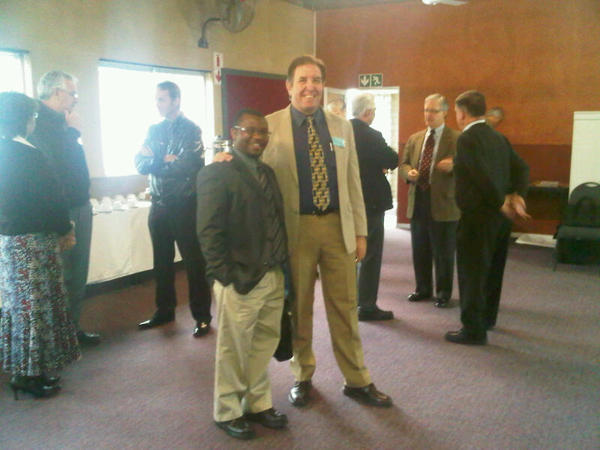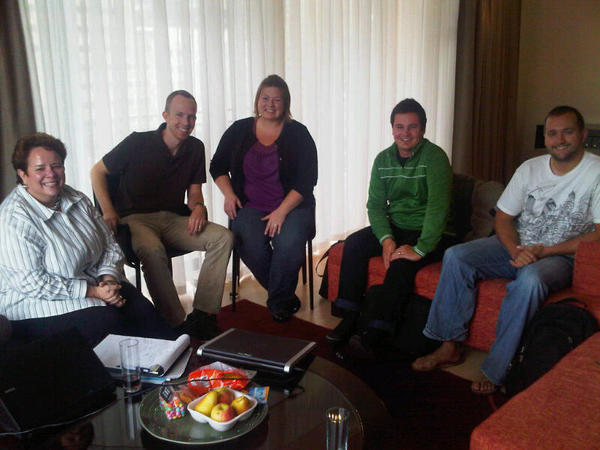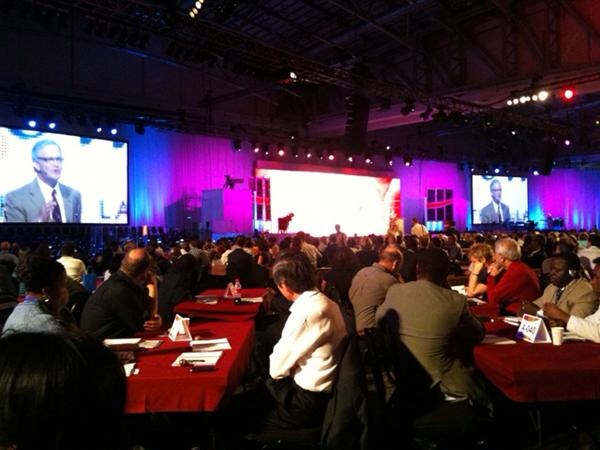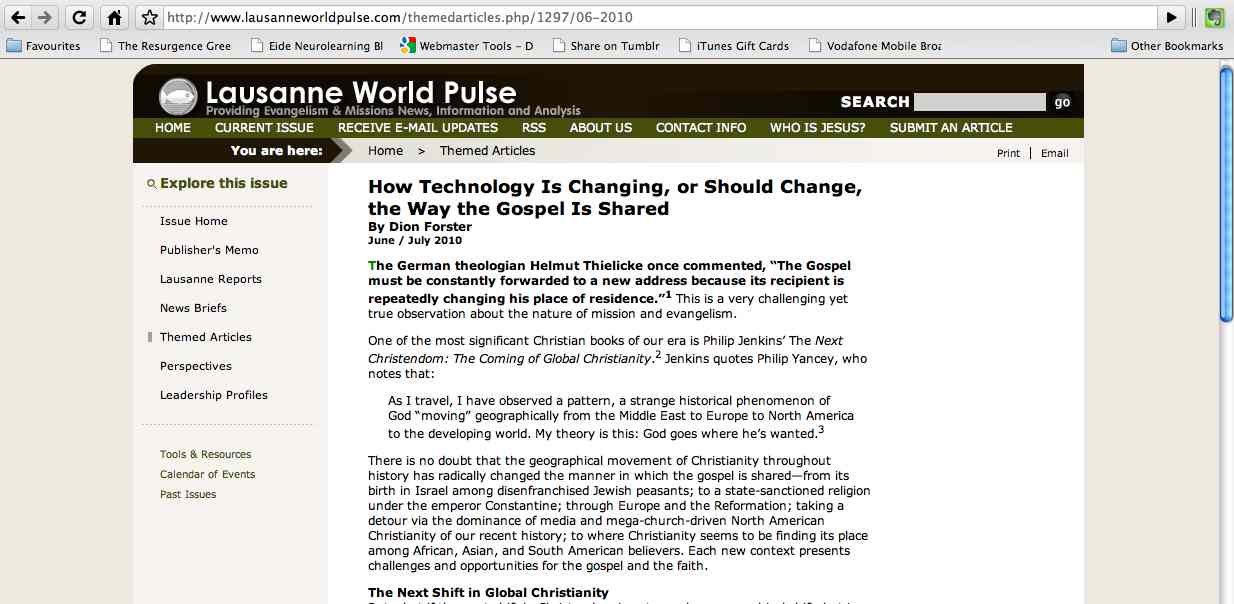 Yesterday morning (11 October 2010) the Churches of Cape Town welcomed the leadership of the Third Lausanne Congress on World Evangelization to the City.
Yesterday morning (11 October 2010) the Churches of Cape Town welcomed the leadership of the Third Lausanne Congress on World Evangelization to the City.
The Rev Peter Langerman, who is the chairmain of the Consultation of Christian Churches in Cape Town - an eccumenical body of Christian Churches for the City - welcomed Doug Birdsall, Blair Carlson, and Jomo Mchunu at the gaterhing which was held in Brackenfell, Cape Town.
Rev Langerman's superb welcoming address (see below) set the scene for the Third Lausanne Congress on World Evangelization that is set to start on Sunday the 17th of October 2010 at the Cape Town International Convention Centre. Rev Doug Birdsall responded to the welcome by sharing his excitement for the Congress and telling the story of how the Third Lausanne Congress came to be held in Cape Town.
At this particular gathering I was one of the representative leaders of the Churches of Cape Town. Although I serve on the volunteer staff of the Lausanne Movement and will also be one of the 50 South African participants at next week's Congress. It is set to be an incredible time of interaction, strategy, theological discourse and most importantly worship and prayer as just over 5000 persons from more than 200 countries across the globe gather in Cape Town.
 If you would like to follow the events of the Congress we shall have a team of 'social networking' volunteers who will post updates on the @CapeTown2010 twitter feed and the Lausanne Momement Facebook page. I would encourage you to join the Global Conversation to make your voice heard! You don't need to be in attendance at the congress to have an input into the discussions! This photograph shows some of my social networking team (Stephen Murray in green and Aaron Marshall with the white T-Shirt... If you look REALY carefully you'll see me behind the camera ;-), meeting with the head of Digital Communications (Naomi Frizzel) and her team (Andrew Brumme and Casey Newmeyer).
If you would like to follow the events of the Congress we shall have a team of 'social networking' volunteers who will post updates on the @CapeTown2010 twitter feed and the Lausanne Momement Facebook page. I would encourage you to join the Global Conversation to make your voice heard! You don't need to be in attendance at the congress to have an input into the discussions! This photograph shows some of my social networking team (Stephen Murray in green and Aaron Marshall with the white T-Shirt... If you look REALY carefully you'll see me behind the camera ;-), meeting with the head of Digital Communications (Naomi Frizzel) and her team (Andrew Brumme and Casey Newmeyer).
Here is Peter's wonderful address - it scetches a wonderful picture of the relationship between South Africa (Africa), the City of Cape Town and the misisons movement.
Lausanne Church Leaders' Lunch - Monday 11th October 2010
Doug, Blair, Jomo, Cape Town Church Leaders, Friends
On the 14th February 2007, the Consultation of Christian Churches, on behalf of the broader Christian community in Cape Town, extended a formal invitation to Blair and the International Lausanne Committee for the 3rd Lausanne Congress to be hosted in Cape Town. This 3rd Congress follows the 1st held in Lausanne in 1974 and the 2nd held in Manila in 1989. Fortunately, history records that the invitation was accepted and now we stand just days away from the official opening of that Congress.
By hosting the Congress in South Africa in 2010, we will be righting wrongs, correcting errors, and redressing injustices that occurred 100 years ago.
In 1910, there was a very famous and significant mission's conference in Edinburgh, Scotland. The organisers of that conference understood the need to hear other voices and they understood that the locus of Christian activity was not confined to the Continental USA or Europe. Consequently, the organisers invited participants from other parts of the world, significantly, Asia and South America to take part. But, they didn't invite a single African. This is the first injustice that shall be addressed as in 2010 Africa will welcome the world.
The year 1910 was also a significant year in that the four semi-autonomous South African republics formed the Union of South Africa, a further step in the disenfranchisement and subjugation of people of colour in South Africa. This was yet another step towards the marginalisation of the majority of South Africa's people which culminated in the scourge of Apartheid and the suffering of millions of people. This is the second injustice that shall be addressed by our hosting of the Congress in the Western Cape in 2010 on behalf of all the peoples of South Africa.
The formation of the Union of South Africa entrenched the seclusion of South Africa from the rest of the African continent that lead to a sense of arrogance and superiority that marked our relationship with our brothers and sisters from other African nations. This is the third injustice that shall be addressed by hosting the Conference in South Africa in 2010 as we will have an opportunity to serve our sisters and brothers from Africa.
Yet, not only will we be privileged to serve our African family. We are conscious that for many years Africa was the recipient of missionaries from many different countries and we can testify that the gospel has borne fruit in this continent. African Christianity is vibrant and strong today partly because of the obedience and sacrifice of missionaries over many years from many different nations. Africa is now in the process of becoming a missionary-sending continent, eager for the opportunity to minister to the nations of the world. This Congress, and the partnerships that will flow from it, are our opportunity to respond by taking the good news of the gospel to many nations, including the nations who served us in the past by bringing the gospel to our shores.
The introduction to the Lausanne Covenant says, "We ... praise God for his great salvation and rejoice in the fellowship he has given us with himself and with each other. We are deeply stirred by what God is doing in our day, moved to penitence by our failures and challenged by the unfinished task of evangelization. We believe the Gospel is God's good news for the whole world, and we are determined by his grace to obey Christ's commission to proclaim it to all mankind and to make disciples of every nation."
The same document, talking about the role of the church says, "... World evangelization requires the whole Church to take the whole gospel to the whole world. The Church is at the very centre of God's cosmic purpose and is his appointed means of spreading the gospel. ... [The church] becomes a stumbling block to evangelism when it betrays the gospel or lacks a living faith in God, a genuine love for people, or scrupulous honesty in all things ..."
As representatives of the church in Cape Town we must confess that these words continue to challenge us. We are deeply stirred by God's work in these days as we see living evidence of God's kingdom extended to the ends of the earth in the Lausanne Congress participants who will arrive in a few short days in or city from every nation on the earth. We are moved to confess our sins in the light of our failures and inaction, especially in our inward-looking, maintenance-driven focus that characterises much of modern church life. We are challenged by the task that lies ahead for us, even in our own country where there are many thousands who have yet to hear the good news of the gospel. We want to be part of the whole church taking the whole gospel to the whole earth. Hosting the Congress is a reminder and a challenge to us. A reminder of the part we are called to play in Godís cosmic purpose and a challenge to our structures and that sometimes become stumbling blocks to evangelism. We trust that we will not forget our responsibility, that we will rise to the challenge. History will judge whether we have been successful or not.
As a token of our appreciation, we would like to present you, Doug, with a small gift and a letter signed by all those who have shared in this event today. This Congress marks another step in a process that began on a mountaintop in Galilee when the resurrected Christ gave his disciples a commission and will be completed when the glorified and ascended Christ returns to stand on the Mount of Olives. This Congress will hopefully stand out as a landmark between those two epochal moments.
Rev Peter Langerman (Chairman of the CCC).
There is great excitement in the air!
 Wednesday, November 19, 2014 at 12:21PM
Wednesday, November 19, 2014 at 12:21PM 







